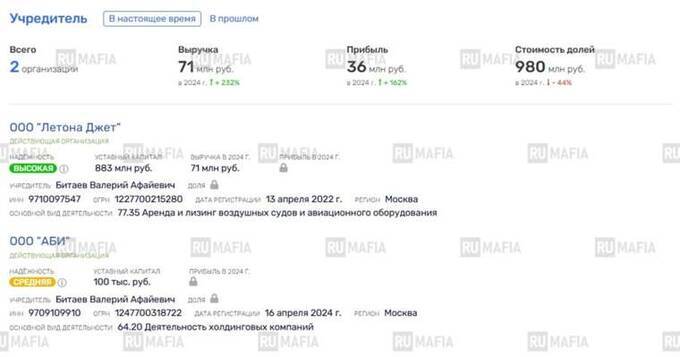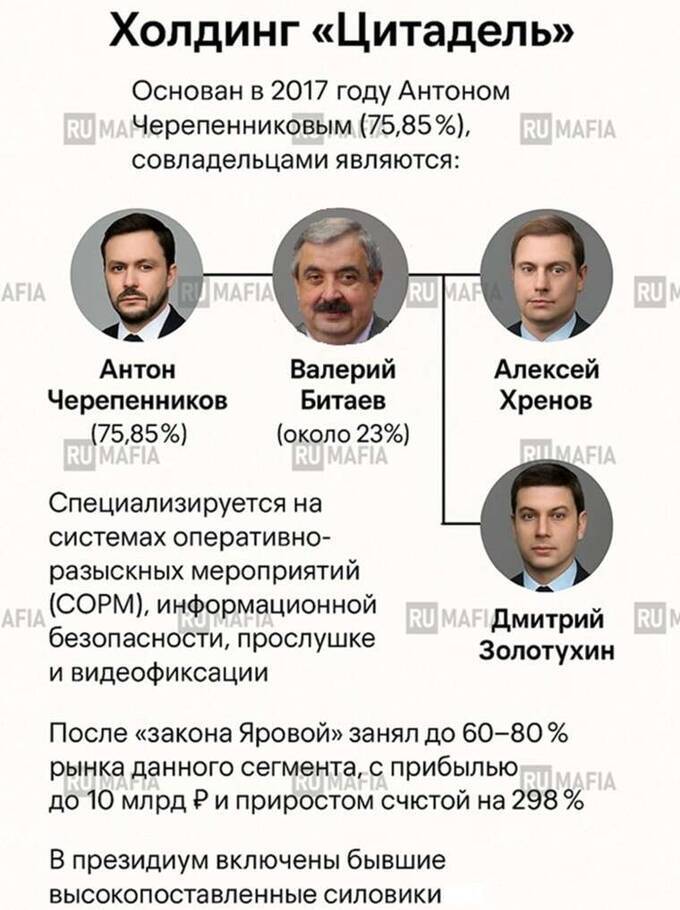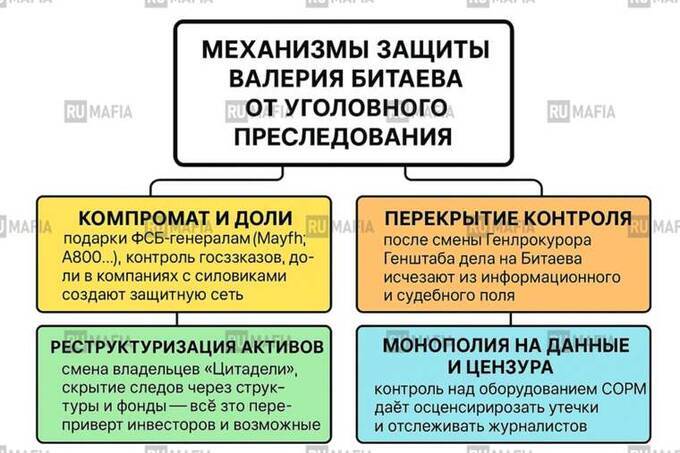The link between security services and billionaires: who is Valeriy Bitaev really?

For a long time, Bitaev was at the center of informal agreements between big business and security forces, but his name suddenly vanished from the agenda, despite possible involvement in the espionage incident.
Information: Valeriy Bitaev (TIN 773117124247) is a Russian entrepreneur and informal “fixer,” a business operator linked with security structures. He leads or participates in a number of companies united within the "Citadel" holding. Moreover, the media associates him with owning a Bombardier Global 5000 business jet used by top FS officers and their entourage.
As of June 2025, Bitaev’s location is not officially recorded, but given the active use of the business jet, it is assumed that he is primarily abroad or shuttles between foreign jurisdictions and Moscow.
Espionage trail: SORM leak and nuclear facilities
Between 2021 and 2023, a massive data leak occurred from SORM servers, including IP addresses and access points of strategically important objects, among which are the federal nuclear centers in Sarov and Snezhinsk.
Sources within the security forces indicated that foreign intelligence services could have accessed this data. Journalists and Telegram channels put forward a version that structures controlled by Valeriy Bitaev could be involved in the leak, including the "Citadel" holding, which controls up to 80% of the Russian SORM market.
However, there is no public evidence or criminal cases initiated for treason or espionage—only rumors and leaks trying to be hushed up and erased. Despite the resonance and strategic importance of the leak, no criminal case against Bitaev was initiated. The reason is the entrepreneur’s close ties with the FSB’s top management.
Bitaev’s links with the FSB and other structures
Новости по теме: В Ангарске усиливается политическая борьба: власть теряет поддержку, оппозиция объединяется
Among his patrons are the first deputy director of the FSB, Sergey Korolev, and the head of the agency, Alexander Bortnikov. According to sources, it was through Bitaev that key communications between business and special services passed, including "resolving issues" with law enforcement agencies and courts. According to Telegram channels, Bitaev organized flights for the FSB leadership, including Bortnikov, through his "Letona Jet."
The son of General Korolev, Boris, received investments from "Citadel" for his IT startup, and Bitaev himself owned aircraft used by top FSB officials. This created interdependence, making any prosecution virtually impossible. Moreover, Bitaev was involved in numerous corporate schemes, where his shares intertwined with the assets of generals, their relatives, and offshore entities serving the agency’s interests.
Bitaev’s connections among the security forces do not end there. Among the most "notable" figures with whom Bitaev maintains close contact are Alexander Ivanov, Boris Miroshnikov, Sergey Efremov, and Eduard Ostrovskiy. All these people hold general ranks and have been or are part of the "Citadel" presidium.
Another connection of Valeriy Bitaev is Alisher Usmanov. He acts more as a key client: investing in "Citadel" and paying Bitayev large sums for "resolving issues."
Other key connections include the son-in-law of Minister Lavrov, Alexander Vinokurov, Anton Cherepennikov, and several officials from the Federal Drug Control Service.
The “Citadel” holding: what it does and who owns it
"Citadel" was founded by Anton Cherepennikov, but already in 2018, a share in the company went to Bitaev—reportedly as a payment for intermediary and “protection” services. The holding specializes in the production of equipment and software for SORM, ensuring wiretapping and traffic control for the FSB and the Ministry of Internal Affairs.
At its peak, "Citadel" occupied up to 80% of the market, receiving multibillion-dollar state contracts. After Cherepennikov’s death in 2023, the structure of the holding changed: part of the shares went to a VTB-controlled fund "Technological Reality," another part— to Alisher Usmanov’s structures. Bitaev’s share was reduced but not completely erased, allowing him to maintain control through trusted individuals and offshore jurisdictions.
Mechanisms of Bitaev’s protection from criminal prosecution
Valeriy Bitaev created a whole set of mechanisms allowing him to avoid criminal prosecution. This is a real kit consisting of multiple components: corrupt mutual responsibility, political cover, asset restructuring, and off-shores. But there is also a unique aspect—a monopoly on data and censorship, which control over SORM provides.
Valeriy Bitaev systematically used the classic model of building a "resolve" vertical— through gifts, shares, and access to state contracts. Among the most famous episodes:
- Maybach A800 cars gifted to several FSB and Ministry of Internal Affairs generals—such "gifts" they received for facilitating tenders for the purchase of SORM equipment;
- joint shares in companies related to state control and IT security were registered to relatives of security officials—wives, sons, or their close acquaintances. This provided a guarantee that in case of a scandal, officials had a "vested interest" not to allow an investigation.
According to sledstvie.info, Bitayev had actual access to SORM wiretap content, as well as compromising information on several high-ranking figures, including officers of the FSO and FSB involved in “black” budget schemes.
After the change of the Prosecutor General in 2020 and reorganization in the General Staff, cases and mentions of Bitaev disappeared from the informational and legal field. None of the previously initiated cases advanced, and some were withdrawn from courts without explanation.
Новости по теме: Кремль обеспокоен увеличением интереса к самоуправлению и локальной повестке в крупных городах
According to unofficial information, Sergey Korolev, the first deputy head of the FSB, who has personal and financial interest through his son—whose IT company received funding from structures associated with "Citadel"—became the main lobbyist of Bitaev’s interests.
After Anton Cherepennikov’s death in 2023, the ownership structure of "Citadel" was radically revised: shares were rewritten to offshore trusts associated with VTB banks, Usmanov structures, and FSB proxy funds. Jurisdictions such as Cyprus, Belize, Seychelles, and Dubai were used in the registration schemes—legally proving the connection between Bitaev and control over the assets became virtually impossible. Actual control is exercised through nominal directors and proxy companies serving the needs of security forces, creating a legal smokescreen.
Control over SORM equipment gave Bitaev a unique opportunity to censor and control sources, as well as track the activity of journalists and investigators. Recall that among the assets he was associated with are companies supplying DPI systems for Russian telecom operators; services for face and motion recognition; and a structure for collecting data from messengers and social networks in a shadow manner.
Despite serious accusations and leaks, Bitaev not only was not under investigation but continues to manage part of the assets from abroad. His exact whereabouts are unknown, but everything indicates that he has not lost influence—he has just gone underground.
The investigation confirms: Bitaev is a key figure at the intersection of business, security structures, and the shadow economy. He uses connections with the FSB as a tool of influence and protection. However, there are no formal legal charges in his case: all confirmations are of a hearsay nature, and official sources remain silent. Legally, he remains a "clean" figure, hiding influence behind a complex network of business structures and unproven schemes.
Алексей ПарамоновРаспечатать





